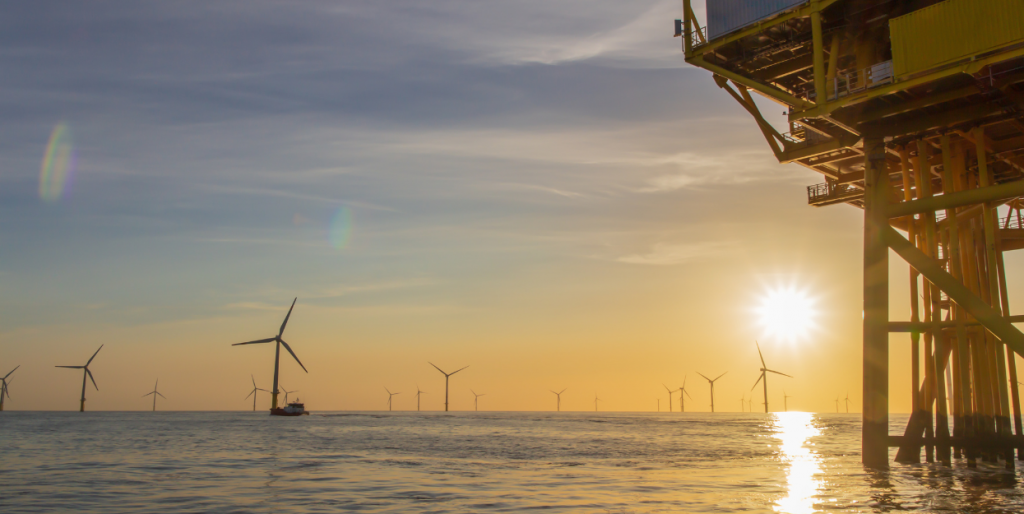What Is GWO Sea Survival Training?
Global Wind Organisation (GWO) Sea Survival Training is one element of a globally recognised certification that provides offshore workers in the wind and renewables’ industry with the skills and knowledge to survive in the event of an offshore accident.
The full GWO certification (called GWO Basic Safety Training) includes five elements:
- Sea Survival Training
- Fire Awareness Training
- Manual Handling Training
- First Aid Training
- Working at Height Training
In this article, we will be covering everything you need to know about Sea Survival Training—what it covers, whether you or your employees need it, and where to get it.
What Is the Global Wind Organisation (GWO)?
The Global Wind Organisation (GWO) is an independent, non-profit organisation that provides a set of standards for the safe operation of wind turbines around the world.
These standards are internationally recognised and followed by leading wind energy companies, making GWO certification essential for anyone wanting to work in the offshore wind industry.
GWO was founded in 2009 in response to a growing need for better safety standards in the wind industry. Its membership includes some of the biggest names in the business, such as Ørsted, Vestas, Siemens Gamesa, and EDF Renewables.
What Does GWO Sea Survival Training Cover?
GWO Sea Survival Training is a one-day course that covers both theoretical topics and practical elements.
Theoretical topics are covered through classroom-based teaching, while the practical elements are completed in a controlled environment (e.g., a pool or marked practice area at sea).
Course topics include:
- An introduction to the risks faced by offshore workers
- An overview of the equipment used in sea survival (e.g., life jackets, lifeboats, flares, etc.)
- An overview of national and international legislation
- How to execute various man overboard techniques
- How to swim in cold water and avoid hypothermia
- How to deal with waves, currents, and tides
- How to safely transfer people and equipment to and from offshore structures
Students who complete the course should be able to demonstrate that they have a clear understanding of their roles and responsibilities in the event of an offshore accident, as well as the skills needed to carry them out effectively.
How Are GWO Sea Survival Courses Offered?
There isn’t a set structure when it comes to the GWO Sea Survival course — each is organised differently depending on the provider.
Typically, courses are 1-3 days long and use a mix of classroom-based theory teaching and practical training to meet their curriculum requirements.
Our GWO Sea Survival Training course (in partnership with Guardian Training) is a 1-day intensive course that covers all the topics listed above.
The course is delivered by instructors with years of experience in both the maritime industry and emergency response, and includes a mix of classroom-based learning and practical training in a controlled environment.

What Are the Prerequisites for GWO Sea Survival Training?
Anyone who wishes to participate in a GWO Sea Survival Training course must be over the age of 18. There are no other formal prerequisites for GWO Sea Survival Training, although it’s recommended that students have a basic level of fitness and swimming ability.
Who Is GWO Sea Survival Training For?
GWO Sea Survival Training is a mandatory requirement for anyone who works offshore in the wind and renewables industry — this includes technicians, engineers, project managers, etc.
When you complete the course, your certification is added to WINDA — a GWO database that allows employers to verify your certification.
Unlike an STCW certification, which is reviewed five years, employers must ensure that an employees GWO Sea Survival qualification is renewed and updated every two years.
However, it’s not just offshore renewables workers who can benefit from a GWO Sea Survival course. The skills and knowledge covered in the course are relevant to anyone who spends time working at sea (e.g., fishermen, sailors, oil rig workers, etc.).
In short, anyone who works or plans to work in an environment where they could be at risk of falling overboard or being exposed to cold water should consider taking a GWO Sea Survival Training course.
In addition, employers in these industries should consider sponsoring employees for the certification to help ensure their safety and the safety of others.
Where Can I Get GWO Sea Survival Training?
If you’re looking for a GWO Sea Survival course provider, the Maritime Skills Academy offers a 1-day intensive course from our Dover headquarters.
This course is run in conjunction with Guardian Training. Guardian Training holds the GWO Accreditation & bookings are made via the following:
- TEL: +44 (0) 1795 580 333
- WEB: GWO Sea Survival Training Course
We’re committed to making offshore work safer for workers, and are more than happy to answer any question you have about the course — so don’t hesitate to reach out!